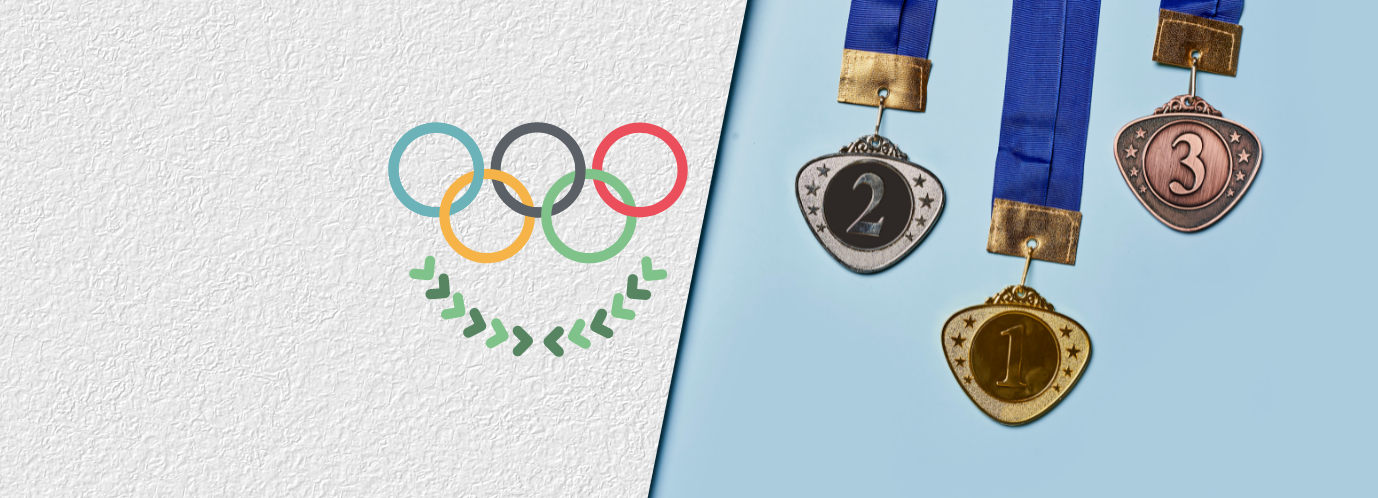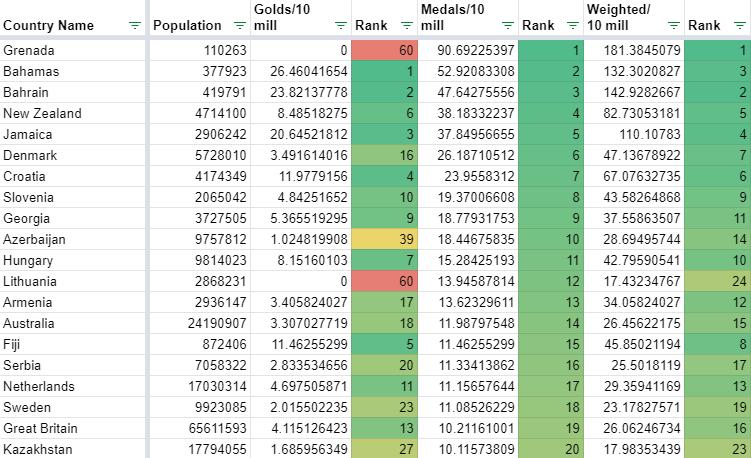Sports Math - Who Wins The Olympics?
For the next two weeks, people around the world will be glued to their TVs, computers and radio watching athletes compete for gold, silver and bronze in their chosen events.

Well, one year and a whole lot of controversy later than it was supposed to be, the Summer Olympics kicked off on July 23rd in Tokyo, Japan. For the next two weeks, people around the world will be glued to their TVs, computers and radio watching athletes compete for gold, silver and bronze in their chosen events.
As a sports fan, I love the Olympics. One of my earliest TV memories is watching the 1996 Olympics in Atlanta, when Canadian Donovan Bailey set a world record in the Men's 100m sprint, and the Canadian Men took bronze in the inaugural Olympic Beach Volleyball tournament, and ever since then, I've been hooked. I'll watch just about any sport, cheering on the Canadian athletes, but also just marveling at the talent, skill and dedication shown by all the competitors.
The medal table is a matter of national pride for many people, and for National Olympic committees as well. The medal table contains the number of gold, silver and bronze medals won by each country, as well as the total number of medals.
Generally speaking, the medal table is sorted one of two ways: either valuing gold medals highest, or valuing total medals highest.
Ranking Method #1 (Gold's First):
- Number of Gold Medals
- Number of Silver Medals
- Number of Bronze Medals
Rank Method #2 (Total Medals):
- Total Number of Medals
- Number of Gold Medals
- Number of Silver Medals
- Number of Bronze Medals
There doesn't seem to be any consensus agreement about which method is standard, other than whichever method makes your country look better. For example, in Vancouver in 2010, Canadians were very happy subscribe to the first ranking method, as we won the most golds, but were only third overall in the total medal count, behind the USA and Germany.
For reference, Wikipedia's medal tables default to the "Golds First" ranking, while ESPN defaults to "Total Medals".
This got me thinking though. Are either of these methods really the best method of deciding who "won" the Olympics, or is there something else that would be better? I've taken the results from the 2016 Olympics in Rio de Janeiro and to test out a few methods.
Overall Rankings:
- Gold First
- Total Medals: These two are the common rankings that I've defined above.
- Weighted Totals: For this method, I've assigned a certain number of points to each medal: 4 points for a gold, 2 points for a silver, and 1 point for a bronze. While the weightings are somewhat arbitrary, I think this makes some sense, as gold medals are more valuable than silvers, which are more valuable than bronzes, but winning a boatload of bronzes and no golds could definitely be seen as preferable
- Monetary value: For those who don't care about sport or sentimentality, maybe the true value of an Olympic medal comes from the value of the physical metals that make up the medal. According to Forbes, the 2016 Gold medals were worth $564, the silver medals were worth around $305, and the bronze medals had "little intrinsic value", so I've weighted them as $0.
Unsurprisingly, Summer Olympics juggernauts like the United States, China and Great Britain rank highly in all four of these rankings. In fact, the top seven countries are the same in all these rankings, other than some minor flip-flopping in terms of order.

No matter which of these rankings you choose, these countries are pretty impressive. Some other interesting notes from these rankings:
- Canada: While Canada ranks 20th according to the Gold First ranking and 21st in terms of Monetary Value, they finished 10th in terms of total medals, thanks to a much higher proportion of bronze medals (15 out of their 22).
- Azerbaijan: Similar to Canada, Azerbaijan would definitely look favourably on ranking by total medals, with only one gold out of 16 total medals.
- Croatia, Switzerland and Argentina: The opposite of Canada and Azerbaijan, these three countries had a much higher percentage of gold medals, so ranked much high in the Gold First ranking than any of the others.
And overall, the correlation between these four rankings though was quite linear, as shown in the graph below comparing Gold First and Total Medal Rankings.
Per Capita Rankings:
In my mind, it hardly seems fair that a country like Canada, with a population of around 36 million in 2016, be expected to compete with the 323 million people in the United States. They're 9 times larger than we are, so I'd expect them to win 9 times as many medals, right?
- Golds per 10 million population: A simple calculation, ignoring silvers and bronzes, of the number of golds per 10 million people
- Total medals per 10 million people:
- Weighted medals per 10 million people: Using the same 4,2,1 weighting as previously
When you start to look at results as a function of the country's population, a new set of athletic superpowers emerge.
Tiny Grenada, with a population of 110,000 about 20% the size of the state of Wyoming, or approximately the same size as Ballarat, Australia, is ranked first in terms of medals per 10/million people, and their weighted score, all thanks to a Silver Medal from Kirani James in the Men's 400m sprint.
Similarly small countries Bahamas (a gold and a bronze in track and field) and Bahrain (a gold and a silver in track and field) round out the top three in the total medals and weighted categories, while taking the top two places in the golds per 10 million.
Of the larger countries (with a population bigger than 10 million), Australia, the Netherlands and Great Britain are the strongest finishers, ranking in the top 20 (but not in the top 10) in all three per capita rankings.

Powerhouses United States (now ranked in the 30s and 40s), China (ranked in the 50s to 70s) and Russia (also in the 30s and 40s) are strongly penalized in these rankings due to their massive overall populations.
While there is some correlation between a country's ranking in the raw categories compared to the per capita categories, it is much weaker.
So far, it seems that if you're a small country, you're better off choosing a ranking by population, while the larger countries would prefer to rank based on the raw number of medals won.
But let's look at one more type of rankings as well.
Per Athlete Rankings:
Another way of thinking about medals is by asking "How much investment did each country put into their Olympic team?" While you could use each Olympic Committee budget, I have decided to use the size of the Olympic team as a proxy. You'd expect the number of athletes to roughly reflect the population of the country, but that isn't always the case. As an aside the correlation coefficient between 2016 country population and Olympic team size is 0.XXXX.
- Golds per 100 athletes:
- Medals per 100 athletes
- Weighted medals per 100 athletes
Ranked this way, a few new countries make it to the top of the table. Tajikistan, Kosovo and all sent very small teams to the Olympics, yet came away with a single gold medal.

In the total medals/100 athletes and the weighted category, the previously mentioned Azerbaijan rises high again, with a whopping 18 medals on a team of only 56 athletes, with 16 of the 18 medals coming in the combat sports of wrestling, Taekwondo, Judo and boxing.
Summary
So how many countries can say they've won the Olympics? Across the 10 rankings I've defined, there are 5 countries with the honour of calling themselves number 1.
- United States: Gold First, Total Medals, Weighted Score and Monetary Value
- Grenada: Medals per 10 million and Weighted Score per 10 million
- Tajikistan: Golds per 100 athletes and Weighted Score per 100 athletes
- Azerbaijan: Medals per 100 athletes
- Bahamas: Golds per 10 million
Check out the full rankings on this spreadsheet to see where your country lies, and how you can get the best bragging rights with your friends or co-workers.
...But wait, there's more...
Really though, deciding winners and losers is subjective, and comes down to what you value most, so in the spirit of that, I've decided to award points to medalists based on the following criteria. Note that this means that team sports get are more highly valued, as all 23 soccer players receive a medal, while for the 100m dash, only one athlete gets the prize. But it's my ranking, so I don't care :)
A Final Ranking
- First Name is Jonathan: 30 points
- Birth Year is 1990: 7 points
- Height is between 5'11" and 6'1" (180 - 185 cm): 3 points
- Athlete is Canadian: 5 points
By this definitive ranking, Canada clearly won the 2016 Olympics with 374 points (followed by the USA with 316 and Great Britain at 206), but the top athlete was actually British triathlete Jonathan Brownlee (with 40 points). Congratulations Jonathan! You may have won a silver medal in Rio, but I'm sure the Mathspace Sports Math Olympic Award will mean just as much in your trophy case!
Sources
- https://olympics.com/ for general Olympics Information
- The World Bank for country populations in 2016
- Forbes for the value of the Rio medals'
- Kaggle.com for details of all the Olympic athletes
- My own warped sense of a desire to win for the final rankings

